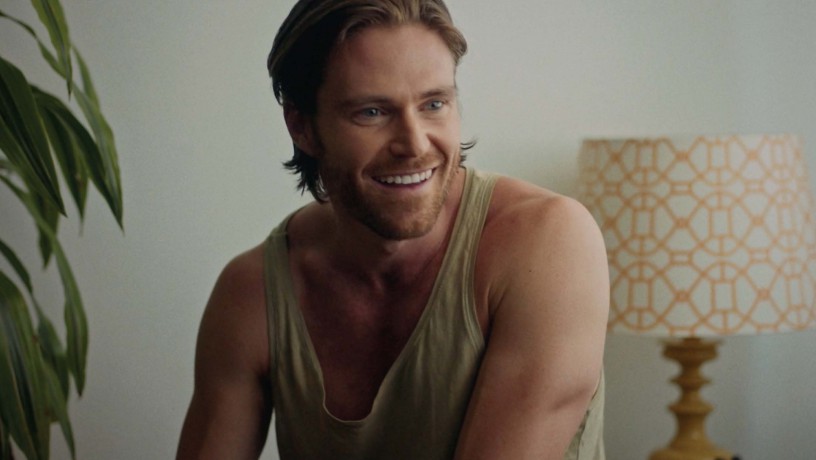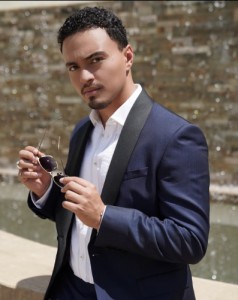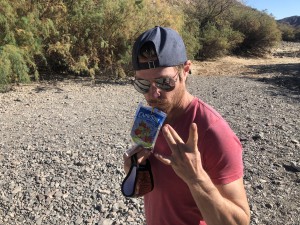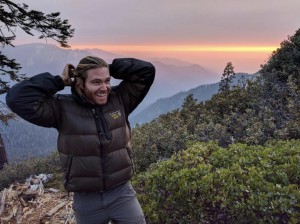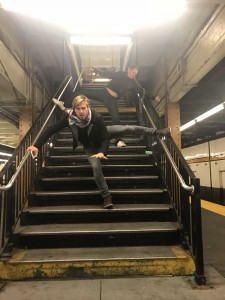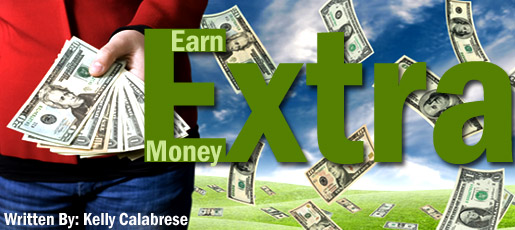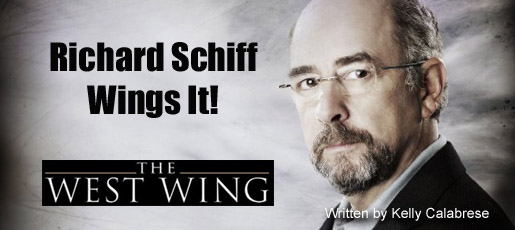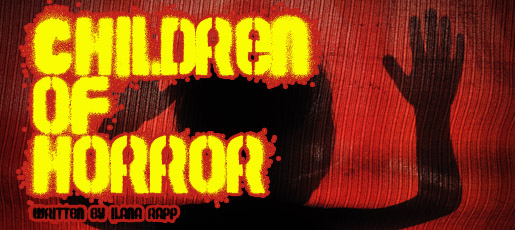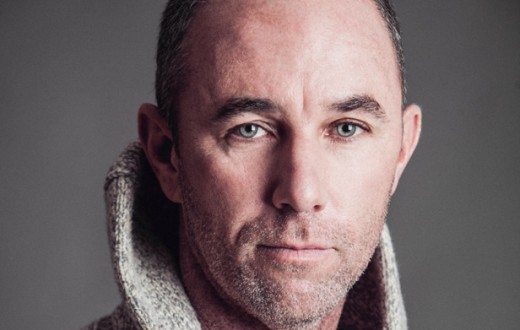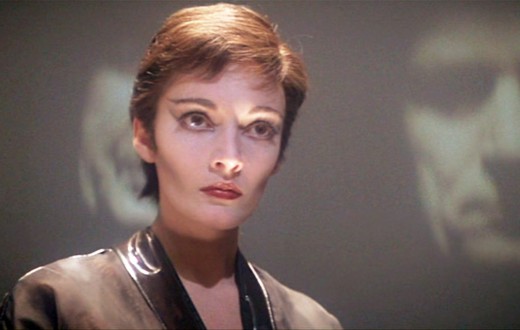What an informative interview with Brant Rotnem on his award-winning LGBTQ+ micro-series HIDDEN CANYONS!
What exactly is a micro-series? Well, I watched two full episodes while brushing my teeth. The show is the latest in the entertainment world’s move toward shorter content production.
The 1-minute soap opera follows strangers’ lives in steamy and fast episodes which end on wild cliffhangers. The show has found a way to revolutionize the way people consume narrative content, while supporting the voices of the LGBTQ+ community. The series is written, produced, and directed by Brant Rotnem, and co-directed by Fawzia Mirza.
Hidden Canyon’s, now with two seasons under its belt, has its home on TikTok. Check it out and leave comments on which characters you love and hate.
Colby, played by Tonatiuh.
I seriously hate the character Colby. Why did you do that to me Brant? Why did you make me hate Colby within 10 seconds?
Ha, you’re not alone! Colby was our most polarizing character in Season 1. People felt very triggered by what he represents. When we workshopped the scripts, the actor Tonatiuh shared some of his own experiences being “Colby’d” by someone else. In performance, I think it can be so fun to play the flip side of scenarios you’ve lived yourself. A lot of our discussions were around finding ways not to judge his character.
I think Colby sparks strong reactions because there’s a lot him out there, particularly in the queer community. So many of us have been Colby’d! But I don’t think anyone is ever pure good or bad. People also had strong reactions to the character of Harrison. In Season 2, we thought it would be interesting to put them together to see what would happen. Tonatiuh and Jeremy Glazer, who plays Harrison, brought a lot of perspective and personal experience to the conversations that led to their storyline. We asked, what’s behind attachment issues? Why do people gaslight? What have these characters been through? It was really interesting to see how their storyline was received – some people were very entrenched in their hatred and didn’t want any redemption. But others came along for the ride. One of my favorite comments on TikTok was, “Great, now you owe us new characters to hate…!”
Is there a double meaning to the title Hidden Canyons? How’d you come up with that name?
We knew from the start that we wanted the series to be a soap so we could have these wild twists and cliffhangers in each minute episode. Since soaps tend to take place in fictitious towns with fun names like Pine Valley and Cabot Cove, we wanted something that fit the SoCal beach setting. We had multiple producer meetings that were essentially us going, “What about Sunset Shores? Misty Palms? Ocean’s Bluff?!” Hidden Canyons felt right for the show’s intrigue. As to whether there’s a double entendre… what do you mean?
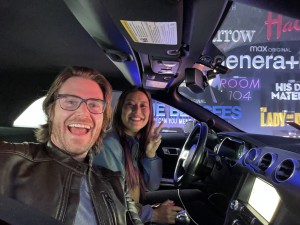 Being that the series can be viewed on TikTok also means that people can comment immediately. Did you change any of the scripts that hadn’t been released yet due to viewer comments? I’m going to ASSUME (ack!!! hiding under a bedsheet now!) that your answer is yes, that you changed up some of the content maybe later on in S1 or S2.
Being that the series can be viewed on TikTok also means that people can comment immediately. Did you change any of the scripts that hadn’t been released yet due to viewer comments? I’m going to ASSUME (ack!!! hiding under a bedsheet now!) that your answer is yes, that you changed up some of the content maybe later on in S1 or S2.
*Whispers in general direction of the bedsheet* HOW DID YOU KNOW?
No, you’ve totally nailed it! Another reason we chose this format is that anything can happen in a soap at any time. We had loose ideas for the direction of the storylines, but also wanted to stay very open to viewer reactions. Some of the episodes have hundreds of comments – when else in Hollywood do you get that much direct feedback?? Most series or films get reviews and some online chatter, but we had tons of input and analysis for every single minute of content. On TikTok people essentially up-vote comments so we knew which ones people agreed with, and which were more fringe. TikTok audiences aren’t shy about letting us know what they like and don’t like, and they keep us honest if there’s anything we’re omitting or misrepresenting. We take it all into account when we write new episodes. It’s very special, almost like a creative collaboration with the audience.
Many writers and directors will never change the story no matter what the viewer comments are. They feel that their vision is their vision and that the audience should base their feelings off that vision. What was going through your mind when shaping up Season 2 for production?
I’m not going to say that we give the viewers exactly what they want… that would be no fun! We often change tack to keep everyone on their feet. But I also think it can be really satisfying when you crave a certain outcome on a show and actually get it. We try to keep that balance between subverting expectation and giving audiences what they hope to see. I think that allows them to feel that their input is meaningful. Which it is!
Some of the feedback that was really useful for Season 2 was that there have already been a lot of series and films that deal with cheating gays and nesting lesbians that just want babies. So we tried to flip the script a bit in the second season. Denise deliberately rebels against the stereotype, and none of the gays cheat (directly). There were also a lot of calls for poly representation. Even though it’s a soap, we fought the urge to lean into the potential for drama; it felt important to portray healthy polyamory. A big lesson was that TikTok viewers wanted to engage with the messy questions the show raised rather than just the romantic drama. This encouraged us to tackle live issues like trans girls in sports, and thornier topics like the historical tension between cis white gays and the rest of the community.
Quick break during filming.
You have lots of stereotypes in the series that people may consider LGBTQ+ stereotypes (cheating, non-monogomy, etc.), but honestly, aren’t those same stereotypes in the straight world, too? What’s different in the LGBTQ+ community vs. the straight community?
A lot of these scenarios are have universal elements to them, and it’s been great to hear from a lot of non-queer viewers that they identify with the characters and what they’re going through. But there are also situations that are just different in the LGBTQ+ world. In the straight world, it’s rare that someone’s current partner and ex would connect in a way that throws the relationship into jeopardy, as it does with Colby, Trent, and JB (This came from my real life, by the way…) Communication around parental roles can get muddled when queer couples decide to start a family with the help of an outsider (also from my life!) Most of our plots come from the lived experiences of our creators and cast. We really tried to craft stories that show characters facing relatable struggles with career, identity, relationships, and life-planning, while filtering them through a uniquely LGBTQ+ lens.
You were a dual-graduate of UC Berkeley’s Theater and Performance Studies and International Environmental Politics. What the blip is International Environmental Politics? Which side of the brain does International Environmental Politics fit into? How do you incorporate both of your majors into the work that you do today?
I knew in school that I wanted to act, but at the time, it didn’t feel important enough. I felt that the world was coming to an end unless everyone started really working to stop the apocalypse. So my first few years out of school, I worked as an environmental consultant, and tried to launch a big project focused on energy efficiency. It ultimately failed, and I was miserable the entire time. I started to wonder, what was the point of making myself so unhappy if it wasn’t actually doing good for the world? Acting was this bug I could never shake. I had started as a kid and trained my whole life. I was happier on literally any acting job than I ever was in the environmental world, even when things were at their best. I would do tiny non-Union plays in my free time, or sit in a hot tent all day for one line in an industrial — I didn’t care. That was home.
Now I believe that we have enough science, and enough people working on the technology. The biggest problem is too many people still aren’t on board with climate science, which gets in the way of the policy and investment shifts we need. I think that when facts aren’t getting through, emotion has a critical role to play in shifting perspective. We need more climate in narrative media, not just documentaries. Even though Hidden Canyons is a light soap opera, climate anxiety creeps into Season 2 a bit, and my future projects will be focused on it as well.
Location scouting.
With Hidden Canyons being low budget, what types of hoops and obstacles did you have to jump through to make everything legal with SAG-AFTRA?
We operated under a SAG Micro-Budget agreement, which enabled us to use union talent at indie rates. The biggest challenge was meeting the Union’s COVID requirements for Season 2, which added 20% to our budget. But it was important that everyone on set felt safe, and we took it very seriously. No one ended up getting sick!
What’s your opinion on straight actors playing gay characters? I remember some gay actors playing straight, but not even enough for me to remember in what — so there were more straight actors playing gay.
Neil Patrick Harris in How I Met Your Mother! That’s the first one that comes to my mind… of course there are others, but you’re right that there are a lot more straight (or non-out) actors playing queer roles.
I think of acting as transformation, and I don’t think there’s anything about being gay that a good actor can’t “get”, regardless of their sexuality. In an ideal world, the role should go to whoever is best for the part. But we don’t live in an ideal world, and roles often don’t go to the best actor. Openly gay actors are passed up for straight roles because of fears that their personal lives will hurt the project’s chances in certain markets. Straight actors are cast in gay roles because they are considered more “bankable”. But why don’t we have more “bankable” LGBTQ+ actors? The long-standing stigma against open sexuality has hurt a lot of people’s careers and kept them from reaching the same level as their cis-straight counterparts. So I do think the playing field needs some leveling, and some of that involves casting queer and trans actors whenever and wherever possible. One way to do that is to favor the community in opportunities to play itself.
Let’s dig deep down into your childhood and try to help some youngsters who may be reading this. At what point in your life did you realize you were part of the LGBTQ+ community? Did you “experiment” or you knew right away? Share your coming out story. What advice do you have for people who are struggling with their identity?
Oh man, we could do a whole interview on this one! I realized I had “queer leanings” (I guess you could say!) before I was a teenager. But there was a disconnect between what I was attracted to and how I saw the LGBTQ+ community. It wasn’t a part of my life growing up, so I only knew what being gay was from depictions in media. Gay men were often shown as caddy, vapid, and obsessed with fashion and Madonna. This just didn’t gel with how I saw myself or what I wanted to be. I wanted to go hiking and to Arcade Fire concerts. I had no idea the community was a big, broad, and diverse as it is, and that there was plenty of space for me exactly as I was. In addition, I was surrounded by homophobia at school and even at home. It was terrifying to think that there was a part of me I didn’t choose, and if people found out about it they might all suddenly hate me. How does that make any kind of sense??
To anyone struggling, I would say there’s no wrong version of the journey. Coming out is never easy, and some people have it much harder than others. There’s no right or wrong time other than when it’s right for you. And no one can tell you how you should act or identify. To anyone that doesn’t already have this community in their lives – I want to say it’s one of the most special communities on Earth. And it’s here for you. I feel so privileged that I’m a part of it.
Work hard, play hard.
As well as being a writer, producer and editor, you’re also an actor and have a role in Hidden Canyons. What’s it like being on both sides of the camera? Do you enjoy behind the scenes or in front of the camera better? Since you’re wearing many hats in Hidden Canyons, how do you know which hat to wear when? Do you have certain days where you’re ONLY directing and certain days where you’re ONLY acting, or do the hat wearing days get combined as needed? Sounds exhausting! I don’t even know if my question makes sense…but I’m sure you can decipher it because you majored in International Environmental Politics!
Ha! Yes, in my major we spent all our time dissecting multi-pronged questions!! (…No really though…)
First off – I don’t direct myself. There are three directors, including me and the unstoppable Fawzia Mirza and Nava Mau, my heroes. So I at least get to take one very big hat off when I’m on camera. Our trust is deep enough that I get to fully be in performance-mode on my acting days. We shoot one storyline at a time so there aren’t any days when I’m jumping back and forth. My incredible co-producers Jeremy Glazer, Cherie Rice, Lysa Nevarrez, and Chris Hanada pick up the slack when I can’t focus as much on production. And my Director of Photography Stephen Tringali is so much more than a DP; I often feel that he’s making the whole picture just happen.
To be honest, I never really thought of myself as more than an actor before Hidden Canyons. This project was my attempt to get my on-screen work out there, while boosting visibility and employment for my community. But I’ve totally fallen for writing, directing, and editing. We’re in this segmented industry where there’s pressure to choose a lane, but a lot of multi-hyphenates are breaking that mold and showing that one person can work in multiple arenas. To me, creating is creating. I want to make impactful work and I’m in love with multiple elements of the process. Making film and TV is magic and it’s a joy to be part of it all.
Anything else you’d like to say?
Watch us! On Tiktok if you can; that’s where the discussion is liveliest. And let us know what you think.
I promise we’re listening.
Social Media:
TikTok: @hiddencanyonsseries
IG: @1minutegaysoap

